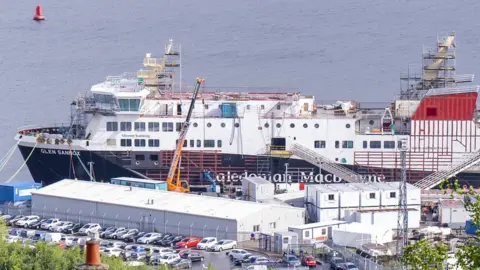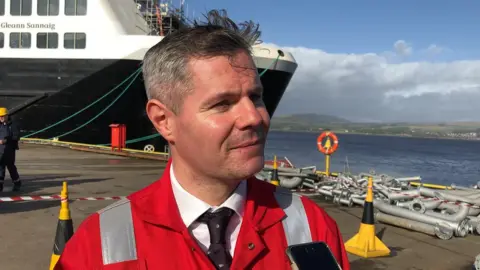FM denies ferry contract was 'jobs for the boys'
Nicola Sturgeon has said she "completely and utterly" refutes suggestions of political interference in the award of an ill-fated ferry contract.
She was asked if the award to someone with a known relationship with the government was "jobs for the boys".
The first minister insisted there was "absolutely, categorically" nothing untoward in the procurement process.
MSPs are investigating delays and overspends over two CalMac ferries.
The construction project at Ferguson shipyard in Port Glasgow is five years behind schedule and could end up costing the public purse more than three times the original £97m "fixed price contract" price.
Ms Sturgeon was giving evidence before the public audit committee following a damning report from Audit Scotland which listed "multiple failings" in the process.
The contract was awarded in 2015 to the Ferguson Marine Engineering Ltd (FMEL) shipyard in Port Glasgow, a year after it had been rescued from administration by Jim McColl, a pro-independence businessman who sat on the first minister's council of economic advisers.
Conservative MSP Sharon Dowey asked if the award to a firm owned by Mr McColl was a case of "jobs for the boys".
Ms Sturgeon responded: "If you are saying was there anything untoward in this procurement process in order to somehow inappropriately steer this contract towards FMEL, then absolutely, categorically not."
She said she naturally was happy for work to go to a Scottish company which would secure Scottish jobs - but it was important that this was done "by the book".
And she insisted the award was made solely on the assessment of the bids by government owned ferry agency CMAL.
 PA Media
PA MediaMs Sturgeon accepted that a recent BBC documentary which presented evidence that FMEL was given preferential treatment in the procurement process had raised "serious issues" that should be investigated further.
However, she said she was personally not aware of any impropriety.
The Disclosure programme found that FMEL was allowed to substantially alter its design and price after the tender deadline, and had access to a key CalMac specification "wishlist" that was not available to rival bidders.
The first minister was asked why then transport minister Derek Mackay approved the final award of the contract to FMEL in October 2015 despite serious misgivings by the CMAL board about the level of financial guarantees being offered.
She said that various mitigations had been sought to reduce the risk and, based on what information was available to him at the time, she thought it was a "reasonable decision".
She said: "To be fair to Derek Mackay, had that 8 October [documentation] been brought to my attention, based on everything that was in that, I am not saying I would have reached a different decision - I don't think I would have done - but perhaps with hindsight it should have been brought to my attention."
Mr Mackay, who left government in 2020 over messages he sent to a 16-year-old boy on social media, appeared before the public audit committee in September.
 PA Media
PA MediaAt the start of the hearing, committee convener Richard Leonard questioned the government's commitment to transparency over the ferry fiasco.
He pointed out that a letter from Mr Mackay, submitted to the hearing by Transport Scotland appeared to have been "edited" to remove two key paragraphs relating to financial guarantees.
The first minister insisted her government was committee to openness, and that she believed the issue of the letter was imply a "formatting" error.
She pointed out that a full version of the same letter had been submitted by SNP MSP Stuart McMillan, who was its recipient.
The first minister said she would look into publishing more documentation including a record of a meeting with Jim McColl in May 2017 at which he raised concerns about the way the project was progressing and the role of the government ferries agency CMAL.


One word which notably has not crossed the first minister's lips today is "sorry".
While Nicola Sturgeon accepts responsibility for what went wrong on her watch, she denies she's to blame.
That's a hard balance to strike.
Especially since this ferry crisis has happened on her watch as first minister - all the way back to late 2014, when she took on the top job.
Within a year, the contract to build two ferries had been awarded to Ferguson shipyard.
By November 2017, the first minister herself was launching the first of the vessels, MV Glen Sannox.
Few there on the day - myself included - knew that ferry was largely unfinished and the engines didn't work.
No-one - including Nicola Sturgeon - knew that five years later, the ferries would still not be ready.
She's said repeatedly the buck stops with her. She is accountable, she insists.
But she clearly sees this as a collective, systemic failure, and not one for which she is personally to blame.
